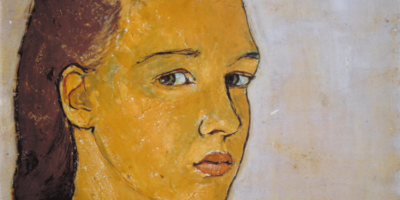Feminist Political Theater Crosses Boundaries in Jerusalem
The interchange between Arab and Jew in the Middle East plays out in political extremes, from the ultimate expression of irreconcilable hatred in the person of the suicide terrorist to the harnessing of great symbols of nationalism to lead entire peoples into mutual acceptance. The social and cultural exchanges between Palestinian and Israelis have been far less dramatic and often take place at the margin of the political dialogue.
In the play Cycles (Maagalim in Hebrew), the Jerusalem theater troupe “Eshet Ofra” (Woman of Earth) transcends Arab-Israeli ideology. Eshet Ofra describes itself as “a group of women, Palestinian and Israeli . . . who have taken upon themselves to work together in theater.” The cast of Cycles, two Israeli and two Palestinian women, uses three languages (Arabic, English and Hebrew) interchanged, almost line by line as they portray the life passages of Lulu.
This is the story of a woman. Her character progresses from a small Arab girl outraged by the societal proscriptions imposed on her in order that she conform to her role, to a confused and sexually ambivalent Israeli adolescent, a rebellious Arab bride to be, then finally to a generic western careerist, struggling with her priorities and expectations.
Lulu is played by different members of the cast as the play goes on, and her language changes from scene to scene, along with the phase of her life and the stage setting. However the themes of a woman defining her life and femininity in the face of the reality of societal mores, traditions and expectations remain constant, as do the other women in the play—variously a chorus of confidantes, friends, agents of stifling coercion and finally a coven of delphic witches in the Tel Aviv city dump.
The groups members—Naomi Ackerman, Raid Ghazala, Corrine Markov, and Iman Oun, along with director Shai Bar Yaacov—collaborated in writing Cycles, bringing to the project experiences and impressions of women in two separate but connected societies. As the play follows some “universal” life events of Lulu, it is laced with the culture and folklore of Jewish, Arab and modern Israeli life and rides a shifting tide of language, easily grasped if one is fluent in two of the languages and probably still comprehensible if the audience knows only one.
The play itself makes no reference to the politics of the day, but its existence could not be divorced from surrounding realities. Rehearsals were postponed at times until necessary permits could be obtained by the Palestinian actresses, who live on the West Bank, to enter Jerusalem during periods when access was restricted. According to Ackerman, Eshet Ofra is the first Israeli theater group to perform in East Jerusalem in Hebrew since the city was reunited in 1967. Ackerman, one of the Israeli actresses, described this experience as very different from performing in front of Israeli audiences “There, (in East Jerusalem) the Arab folktales in the script evoke enormous response from the audience, for whom they are familiar and symbolic. The audience is much more interactive and expressive than in West Jerusalem.” Although most performances are at the group’s home theater, Habamah, in Jerusalem’s industrial Talpiot section, in front of mainly Hebrew-and English-speaking audiences, the play was performed at the Arabic Theater Festival in Nazereth, and the group hopes to perform at some point in Jericho or Gaza
In these heady days of change in the Big Picture in Israel and the Middle East, Cycles and Eshet Ofra represent small but significant changes taking place in perception and reflection in the hearts and minds of the people who see its performances. For tickets and information call Habamah Theater in Jerusalem telephone (02) 733814.


